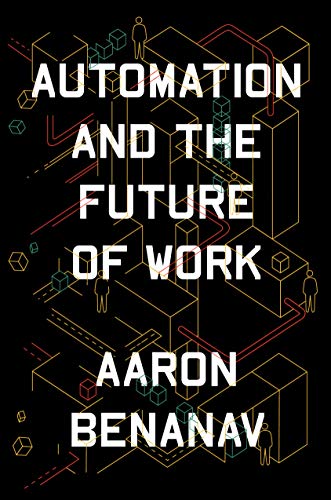Automation and the Future of Work by Aaron Benanav Link to heading
Summary Link to heading
“Automation and the Future of Work” by Aaron Benanav challenges the common narrative that automation and technological advances are predominantly responsible for the loss of jobs in contemporary economies. Instead, Benanav argues that the real culprit is economic stagnation, exacerbated by industrial overcapacity and insufficient demand. The book examines the historical and economic factors that contribute to this stagnation, shedding light on how the economy’s structural dynamics shape employment patterns and societal impacts. Benanav’s analysis critiques the optimism surrounding technological determinism and proposes a more nuanced understanding of the challenges and possibilities facing the workforce.
Review Link to heading
Aaron Benanav’s “Automation and the Future of Work” presents a compelling critique of the prevailing discourse on automation and job displacement. His arguments are well-researched and provide a fresh perspective that challenges simplified mainstream narratives. A notable strength of the book is its historical and economic depth, which offers readers a broader context to understand the inequalities and inefficiencies within current labor markets. One weakness, however, could be the dense economic theories that may be challenging for readers unfamiliar with such topics. Overall, the book makes a significant contribution to discussions on the future of work and the necessity of exploring alternative economic models.
Key Takeaways Link to heading
- Economic Stagnation: Stagnation, not automation, is the primary cause of job losses, linked to global production overcapacity and limited economic growth.
- Structural Economic Issues: The current economic system favors capital accumulation and productivity gains over creating sustainable employment opportunities.
- Technological Determinism: Caution is urged against the determinist view that technology alone shapes future job markets; broader socio-economic factors are at play.
- Alternative Economics: The book calls for reconsidering economic models and policies that prioritize human welfare over capital growth.
Recommendation Link to heading
“Automation and the Future of Work” is highly recommended for economists, policymakers, students in social sciences, and readers keen on understanding the complexities of modern labor markets beyond technological explanations. Those interested in economic history, labor studies, and political economy would particularly benefit from Benanav’s insights into how systemic economic issues affect the future of work.
